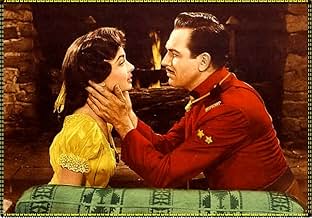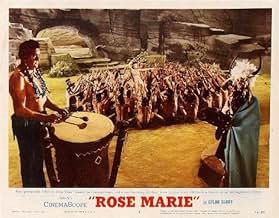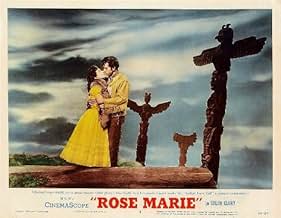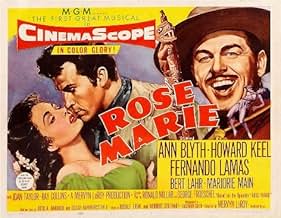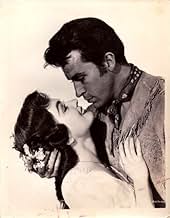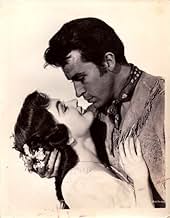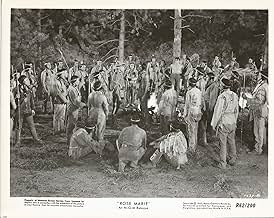IMDb RATING
5.8/10
584
YOUR RATING
Wilderness girl Rose Marie has adventures in life and love when Mountie Mike Malone takes her out of the wild.Wilderness girl Rose Marie has adventures in life and love when Mountie Mike Malone takes her out of the wild.Wilderness girl Rose Marie has adventures in life and love when Mountie Mike Malone takes her out of the wild.
Dorothy Adams
- Townswoman
- (uncredited)
Fred Aldrich
- Woodsman in Saloon
- (uncredited)
Robert Anderson
- Corporal
- (uncredited)
John Angelo
- Man at Charity Dance
- (uncredited)
Emile Avery
- Mountie
- (uncredited)
Walter Bacon
- Man at Charity Dance
- (uncredited)
Al Bain
- Woodsman in Saloon
- (uncredited)
Margaret Bert
- Townswoman
- (uncredited)
Chris Willow Bird
- Indian
- (uncredited)
Oscar Blank
- Woodsman in Saloon
- (uncredited)
Featured reviews
Canadian Mountie Mike Malone (Howard Keel) encounters orphan Rose Marie Lemaitre (Ann Blyth) on her canoe in the wilderness alone. Her father was a French trapper. She would rather live alone in the wild. Malone forces her back to Fort Macroy where she continues to rebel. In time, she joins the Mounties under Malone. She falls for French trapper James Severn Duval (Fernando Lamas).
This musical is reportedly one of Busby Berkeley's last movie work. The exterior shots have the amazing Canadian wilderness vista. The music is more opera in nature which is not my taste. Otherwise, this romance mostly works although it is very old fashion. There is some awkward stuff which is the old fashion stuff.
This musical is reportedly one of Busby Berkeley's last movie work. The exterior shots have the amazing Canadian wilderness vista. The music is more opera in nature which is not my taste. Otherwise, this romance mostly works although it is very old fashion. There is some awkward stuff which is the old fashion stuff.
Saw this on a massive CinemaScope screen during its first-run release at the Egyptian Theater in Hollywood, California. If memory serves (since I haven't caught it on a Turner Classic Movies broadcast recently) it was enjoyable and nicely mounted, although I seem to recall that a lot of it was done on some massive MGM soundstages rather than outdoors in the northern California and Canadian locations. Of course that was usually the case with musicals with outdoor settings. Technical considerations prompted the studios to go the easy route of utilizing the more easily controlled environments of, in MGM's case, their Culver City, Calif. lot and stages subbing for the great outdoors. Howard Keel and Ann Blyth (and Fernando Lamas, too) acquitted themselves quite nicely in the vocal department. And any movie that gives us Marjorie Main and Bert Lahr for some expert comic relief is to be fondly remembered. Although its popularity may not merit it, it would be nice to add a DVD version, not yet available, it appears, of this widescreen/stereo remake to one's video library.
Not enough good things can be said about this beautiful musical, one of my favorites. It has the right combination of romance, conflict, suspense, tragedy, and comedy in the plot. The setting is in the colonial or exploration era of Canada, and the rivalry between English and French Canadians is evident.
The story is about Rose Marie (Ann Blyth), a tomboyish girl that her guardian Mountie (Howard Keel) tries to civilize. Rose Marie is grateful to him, but she truly loves the French trader Duval (Fernando Lamas), who accepts her as she is. The unrequited love an Indian girl has for Duval adds to the conflict and leads to the tragic elements in the film. However, justice and a happy ending prevail.
I commend Turner Broadcasting for keeping "Rose Marie" alive by showing it on the movie channel, but I would love to have a quality DVD version. I hope it will be on DVD soon.
The film has inspired me to look for the sheet music and script from the musical, and I am very disappointed that I cannot find a "Rosemarie" songbook. If any music and script publishers are listening, they should have the score and script of this film in print.
The story is about Rose Marie (Ann Blyth), a tomboyish girl that her guardian Mountie (Howard Keel) tries to civilize. Rose Marie is grateful to him, but she truly loves the French trader Duval (Fernando Lamas), who accepts her as she is. The unrequited love an Indian girl has for Duval adds to the conflict and leads to the tragic elements in the film. However, justice and a happy ending prevail.
I commend Turner Broadcasting for keeping "Rose Marie" alive by showing it on the movie channel, but I would love to have a quality DVD version. I hope it will be on DVD soon.
The film has inspired me to look for the sheet music and script from the musical, and I am very disappointed that I cannot find a "Rosemarie" songbook. If any music and script publishers are listening, they should have the score and script of this film in print.
10sdiner82
Why hasn't this MGM musical ever gotten the acclaim it deserves? The CinemaScope/Eastman Color cinematography of the Canadian Rockies serves as a dazzling backdrop for a rousing Mounties adventure saga. Which also happens to feature a gloriously composed and sung score--Ann Blyth and Fernando Lamas's rendition of "Indian Love Call" is enthralling. Check this out the next time it shows up on Turner Classic Movies. Like "River of No Return" (with Mitchum & Monroe--shot the same year in the same breathtaking locale), it was one of the first films to exploit the new anamorphic process in its full glory--and has never been surpassed.
With a deliciously hilarious romantic subplot involving those two comedic geniuses, Marjorie Main and Bert Lahr. What more could one want? As Howard Keel sings to Blythe in the course of the title song, "Rose Marie I love you" . . .
With a deliciously hilarious romantic subplot involving those two comedic geniuses, Marjorie Main and Bert Lahr. What more could one want? As Howard Keel sings to Blythe in the course of the title song, "Rose Marie I love you" . . .
In this third film of Rose Marie and probably the last one we'll ever see, every single version of the film is different to each other and to the plot of the original Broadway show. Since operettas are a thing of the past I doubt another version would be made. Where would you get voices like Ann Blyth, Howard Keel and Fernando Lamas?
This version has Ann Blyth as Rose Marie, a trapper's daughter now alone out in the woods. Though she's pretty capable of taking care of herself, those in authority don't see it that way. Mountie Howard Keel brings her into what passes for civilization in the Canadian west at the turn of the last century.
Keel's seeing Ann in a whole different light when she puts on a dress, but trapper Fernando Lamas will take her any old way, so Ann's got to choose between them.
The main songs from the 1936 version make it here, you couldn't really do Rose Marie without Indian Love Call, The Mountie Song or the title number. Rudolf Friml wrote some other nice songs for the original Broadway production which didn't make it into the classic Nelson Eddy/ Jeanette MacDonald version or this one.
Friml contributed some new songs in what would turn out to be his next to last songwriting assignment and they're well suited for the voices that have to sing them. Otto Harbach and Oscar Hammerstein, II did the original lyrics for Broadway, but in this Paul Francis Webster collaborated with Friml and provided the words.
For comic relief we have Marjorie Main and Bert Lahr, playing something along the lines of a cowardly Mountie. But actually he proves to be of invaluable help to Howard Keel.
Keel in his memoirs was not originally satisfied with the Mountie part, feeling he was written like a Dudley DooRight idiot in the first draft. Some considerable rewriting was done before he went before the camera.
He also tells of a practical joke that second unit director Howard Koch pulled on director Mervyn LeRoy by having Jack Benny show up in a Mountie uniform and mess up the takes of the Mountie Song. Benny and LeRoy were good friends and when LeRoy realized who it was, he broke up and shooting was done for the day.
Busby Berkeley got some work in this film, staging the Totem Tom Tom number. There are words to the song, but you won't hear any in this or in the earlier one. Totem Tom Tom is nicely choreographed. I'm always amazed at how Rudolf Friml who studied under Anton Dvorak in Prague before coming to America was able to capture the American Indian rhythm with that song.
This 1954 version of Rose Marie has enough merit to it that it does not suffer comparison with what Nelson and Jeanette did back in the day. Fans of operetta will like it, even devoted Eddy/Mac people.
This version has Ann Blyth as Rose Marie, a trapper's daughter now alone out in the woods. Though she's pretty capable of taking care of herself, those in authority don't see it that way. Mountie Howard Keel brings her into what passes for civilization in the Canadian west at the turn of the last century.
Keel's seeing Ann in a whole different light when she puts on a dress, but trapper Fernando Lamas will take her any old way, so Ann's got to choose between them.
The main songs from the 1936 version make it here, you couldn't really do Rose Marie without Indian Love Call, The Mountie Song or the title number. Rudolf Friml wrote some other nice songs for the original Broadway production which didn't make it into the classic Nelson Eddy/ Jeanette MacDonald version or this one.
Friml contributed some new songs in what would turn out to be his next to last songwriting assignment and they're well suited for the voices that have to sing them. Otto Harbach and Oscar Hammerstein, II did the original lyrics for Broadway, but in this Paul Francis Webster collaborated with Friml and provided the words.
For comic relief we have Marjorie Main and Bert Lahr, playing something along the lines of a cowardly Mountie. But actually he proves to be of invaluable help to Howard Keel.
Keel in his memoirs was not originally satisfied with the Mountie part, feeling he was written like a Dudley DooRight idiot in the first draft. Some considerable rewriting was done before he went before the camera.
He also tells of a practical joke that second unit director Howard Koch pulled on director Mervyn LeRoy by having Jack Benny show up in a Mountie uniform and mess up the takes of the Mountie Song. Benny and LeRoy were good friends and when LeRoy realized who it was, he broke up and shooting was done for the day.
Busby Berkeley got some work in this film, staging the Totem Tom Tom number. There are words to the song, but you won't hear any in this or in the earlier one. Totem Tom Tom is nicely choreographed. I'm always amazed at how Rudolf Friml who studied under Anton Dvorak in Prague before coming to America was able to capture the American Indian rhythm with that song.
This 1954 version of Rose Marie has enough merit to it that it does not suffer comparison with what Nelson and Jeanette did back in the day. Fans of operetta will like it, even devoted Eddy/Mac people.
Did you know
- TriviaJoan Crawford, who played Ann Blyth's mother in Le roman de Mildred Pierce (1945), played the title role in the original 1928 version of this film, which is now considered lost.
- GoofsContrary to what is written on the DVD jewel-box, the "Totem Tom-Tom" number doesn't appear in this version of the operetta. It was replaced by the Totem Dance that is seen in the film.
- ConnectionsFeatured in MGM/UA Home Video Laserdisc Sampler (1990)
- SoundtracksRose Marie
Music by Rudolf Friml
Original Lyrics by Otto A. Harbach and Oscar Hammerstein II
Revised Lyrics by Paul Francis Webster
Performed by Howard Keel; reprised by Bill Lee and the Mounties
- How long is Rose Marie?Powered by Alexa
Details
- Runtime
- 1h 44m(104 min)
Contribute to this page
Suggest an edit or add missing content


